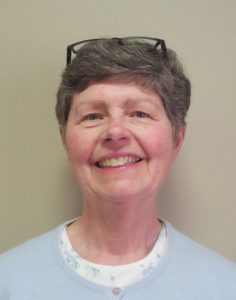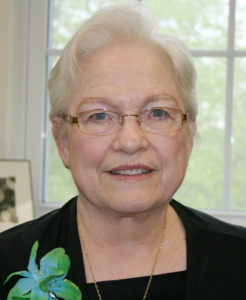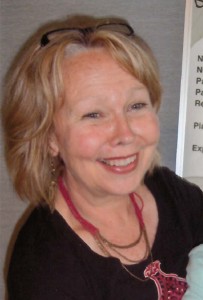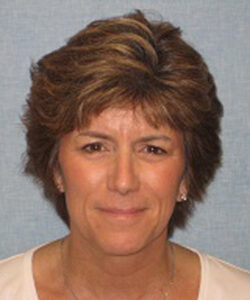How the Church can minister to people with mental illness
By Barb Arland-Fye
The Catholic Messenger
Nancy Roberson struggled with her Catholic faith when her adult son, David, was diagnosed with a mental illness five years ago. “Even with my Catholic education and the things I’ve been blessed with … it was still a very difficult time for me, a crisis of faith you go through. That’s part of the grieving process,” said Roberson, a member of Ss. Mary & Mathias Parish in Muscatine.
David Roberson, now 44, lives independently and is able to take care of his basic needs, his mother says. As with any chronic illness, setbacks can occur.

“I want people to know more about mental illness and that there are many resources available to become more educated,” Nancy Roberson said. “I would like other Catholics to look at the example of Pope Francis and reach out and embrace one another especially those among us that are sick and the poor.”
Catholics might be surprised to know how many people in their parishes struggle with mental illness in their families, notes Nancy Thompson, director of programs and diocesan relations with the National Catholic Partnership on Disability (NCPD).
One in five families in the United States is affected at some point in their lifetime by a severe mental illness such as bipolar disorder, schizophrenia, anxiety disorders and major depression, the National Alliance on Mental Illness (NAMI) reports. With supportive services, counseling and medication, 75 percent of mental illnesses are treatable. But stigma and misinformation remain major barriers to treatment and recovery.
Because of that stigma, some people may suffer quietly and silently. “People don’t want you to see them differently,” Thompson explained during an interview with The Catholic Messenger this May, which is National Mental Health Awareness Month.
NCPD and NAMI offer a multitude of resources about mental illness intended to enhance awareness and dispel misconceptions. Nancy Roberson said she and her son have benefited from participation in NAMI programs.

Thompson highly recommends the NCPD website (www.ncpd.org) and a video that NCPD produced. “Welcomed and Valued, Supporting People with Mental Illness in Parish Life” shares the stories of individuals with mental illness who speak about their needs as Catholics participating in the life of the Church.
David Roberson, who also has a physical disability, had trouble adjusting to college life, his mother said. “During his struggles an ecumenical student group invited him to join their Bible study and work with them on service projects. The friendships he made with those people have been long lasting and have been of great help to him during his lifetime. He feels the need to be accepted and listened to while being invited to join into activities that are offered by the faith communities. His experiences have led him to believe other denominations have done a better job of building community than he experienced in the Catholic Church.”
Her son “wishes that the faithful would be more welcoming, accepting and willing to listen to those that seem different. He likened his experiences with that of the immigrants in our community. Yes we are noticed, but do people take the time to welcome us and invite us to join them in their social activities. Do we have time to listen to their experiences and share in their joy and sufferings?”
While Nancy Roberson thinks the Church has made progress in accommodating people with mental illness and is moving toward better understanding as the faithful become more educated, she sees room for improvement. “I see a special need for family support while people are going through the grieving process of accepting mental illness as an illness like cancer or heart disease. I see a special need for family support while families go through the process of grieving the loss of a family member to suicide.”

Jennifer Hildebrand, coordinator of Health Ministry, Genesis VNA, describes ways in which parish nurses/health ministers can be of help to Catholics with mental illness: “educating the faith community on mental illness and attempting to erase the stigma that is attached to such a diagnosis, offering a presence to the person affected by the illness and/or their family, making referrals to appropriate resources in the community to assist the person, being a friend, developing support groups, etc.”
Hildebrand recently returned from a National Conference for Faith Community Nurses where she learned about an Australian program that provides training for lay people on issues related to mental illness. “These trained individuals are then partnered with a person in the community affected by mental illness. The model is simply based on a healing ministry of friendship! Evidence has proven that both parties gain something from this partnership and the re-admission rate to a hospital significantly declined! We need to follow suit and ‘think outside the box,’” said Hildebrand, a member of Our Lady of the River Parish in LeClaire. “We need to be a more welcoming presence in the Church and greater community. You should never underestimate the power of a simple ‘hello’ or ‘a friendly smile’ to someone in your pew!”
Nancy Roberson reflects on how her son’s experience with mental illness has shaped her Catholic faith:
“I think my Catholic faith, the gift that I received in baptism as an infant, has been the guiding light and source of hope through my whole life. I look at all my life experiences now as the way God has shaped me to be the person that I am today. My hope is that by sharing my story of God’s loving care and involvement others will find hope and strength in their life journey and see the joy and the suffering all as part of the journey to wholeness.”
Reaching out with respect
Efforts to minister to children and adults with mental illness happen on an individual basis as pastors and religious educators are made aware of each person, said Mary Wieser, director of faith formation for the Diocese of Davenport. Privacy and individual rights are respected. It is helpful for a catechist to be informed of a person’s diagnosis to ensure his or her needs are met and that the person can participate as fully as possible in the life of the Church, Wieser said. Religious education directors and youth ministers in Scott and Clinton counties (MORE group) think the issue is so important that a mental health expert was asked to speak on the subject at MORE’s May 20 meeting.
How parish nurses, health ministers can help

Chris McCormick Pries, a member of St. John Vianney Parish in Bettendorf and clinical director of the Vera French Community Mental Health Center in Davenport, recently completed the Genesis Health Ministry Nursing program. She shares with The Catholic Messenger her insights on how parishes can be a welcoming presence to individuals with mental illness.
How can parish nurses/health ministers be of help to Catholics with mental illness?
To ask how parish nurses/health ministers can be helpful to Catholics with mental illness is a complicated question because mental illness is many things and presents with many symptoms. The gift that parish nurses/health ministers bring to all members of the congregation is the gift of presence. Through being available and listening, the worth of each person is supported, and often through listening many find the answers they are seeking.
On a practical level, parish nurses/health ministers are knowledgeable regarding services and programs that may be helpful to congregants with mental illness.
What recommendations would you offer to Church leaders to foster integration of individuals with mental illness into the faith community?
Individuals with mental illness seek acceptance and inclusion. Church leaders, ordained and lay, play an important role in challenging stigma and myths regarding those with mental illness. Welcoming and including all who come to worship is vital.
What are the greatest challenges individuals with mental illness face in terms of participation in the Mass and in parish life?
Individuals with a variety of mental illnesses may experience episodes of symptoms which may be noticeable to those around them, then later feel embarrassed or ashamed of their behavior. These feelings may cause withdrawal or isolation. Reaching out — greeting all individuals with a smile, remembering their name and making eye contact — all of these seem to be simple, but often are forgotten invitations to participate in parish life.
What success stories can you share of people with mental illness who are integrally involved in their Catholic parishes?
This is a difficult question to address because we think all individuals with mental illness are different from each of us. If we remember one in five individuals in this country exhibit symptoms of mental illness at some time in their lives, then look around in the church on a Sunday or at an activity in our parish, there are many individuals with mental illness involved in parish life. Never forget the mentally ill are our parents our children, our spouses, our neighbors and members of our church community.
Resources
National Alliance on Mental Illness (NAMI), www.nami.org
NAMI describes itself as “the nation’s largest grassroots mental health organization dedicated to building better lives for the millions of Americans affected by mental illness.” NAMI has more than 1,000 affiliates nationwide that are engaged in advocacy, support and education. Members of NAMI are families, friends and people living with mental illnesses such as major depression, schizophrenia, bipolar disorder, obsessive-compulsive disorder, panic disorder, post-traumatic stress disorder and borderline personality disorder.
Within the diocese, NAMI Greater Mississippi Valley is introducing NAMI Basics classes designed for parents and caregivers of children who have been diagnosed with a mental illness (or parents trying to figure out if there should be a diagnosis). For more information, visit www.namigmv.org.
NAMI also organizes the largest mental health education and fundraising effort in America through NAMIWalks. For more information on a walk scheduled in your community, visit www.namiwalks.org.
“The education, support and advocacy that NAMI provides is consistent with Catholic Social Teaching,” says Kent Ferris, director of Social Action and Catholic Charities for the Davenport Diocese. “NAMI helps folks living with mental illness. It also helps friends and family of those with mental illness. Being aware of all that NAMI provides means that pastors or parishes don’t need to recreate a support system. They just need to know how to connect parishioners so affected with their local NAMI affiliate.”
National Catholic Partnership on Disability, www.ncpd.org
NCPD was established in 1982 to foster implementation of the Pastoral Statement of U.S. Catholic Bishops on People with Disabilities released in 1978. The document calls for welcoming into the life of the Church the now more than 14 million Catholics who live with disabilities, according to the NCPD website. The pastoral letter states that these individuals must be able to participate in the celebrations and obligations of their faith, and advocates for their inclusion “within the total fabric of society.”
NCPD promotes implementation of the Guidelines for the Celebration of the Sacraments with Persons with Disabilities, approved by the U.S. bishops in June 1995 to provide pastoral guidance on sacramental access for people with disabilities. The NCPD’s mission of inclusion for people with disabilities moves forward through a national network of diocesan-level leaders called by their bishops to address access and inclusion within parishes. NCPD’s executive director Janice Benton and Nancy Thompson, NCPD’s director of programs and diocesan relations, are assisting the U.S. bishops in developing a new pastoral statement on disabilities.








